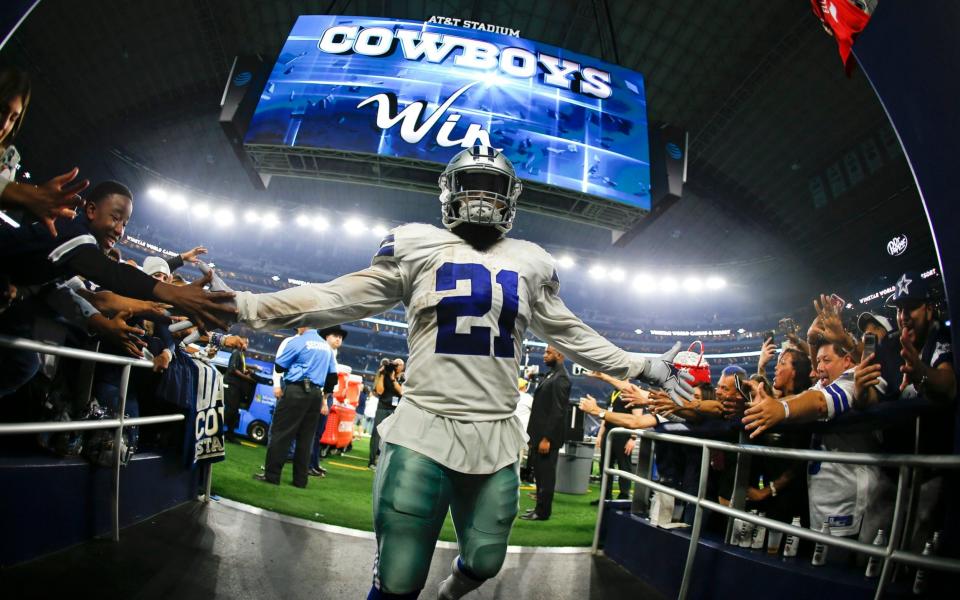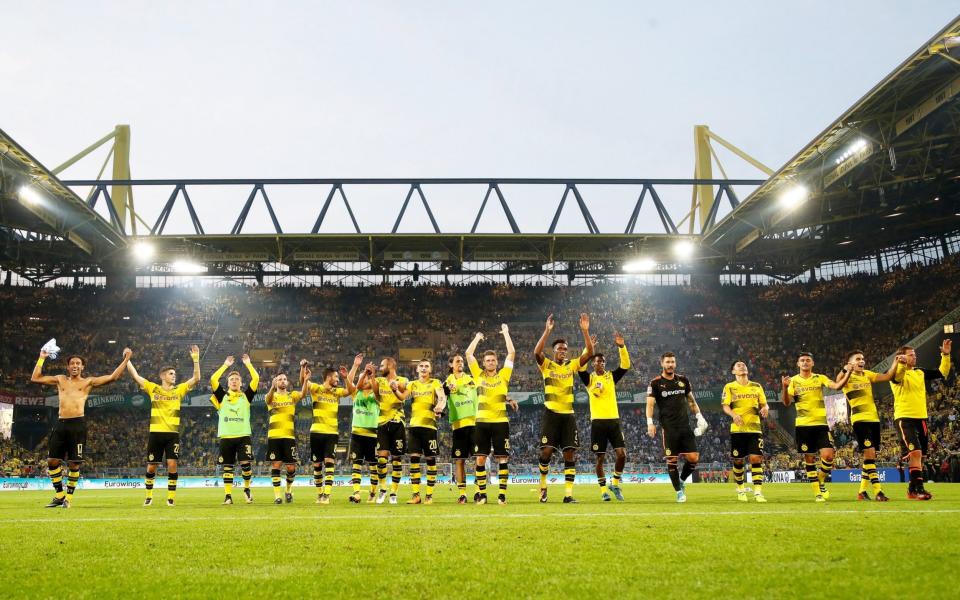The Super League stitch-up is the obvious next step in the Americanisation of European football

The so-called 'Dirty Dozen's' Super League proposals do not simply threaten the whole fabric of European football: they also represent the relentless Americanisation of the sport - a world in which, however much you lose on the field, you are guaranteed to win off it.
Alan Sugar once said that owning a football club was “like drinking prune juice while eating figs”. He was considering his time as Tottenham chairman and making the point that, however much extra money came in, it would be siphoned off to players and agents, or via exorbitant transfer fees.
US sports have long known that, for owners, there is a better way. Since 2000, the Dallas Cowboys have won 177 games and lost 169 - a puny win percentage of 51 per cent - and have failed to even reach a solitary Super Bowl. Yet the Dallas Cowboys are the most valuable sports franchise in the world, now worth $5.5 billion. Mediocrity pays.
The antithesis of the image of America as a nation of unbridled competition, US leagues are run as cartels, with no promotion and relegation. With significant revenue-sharing, there is almost no correlation between winning more and earning more. For every 10 per cent more games that an NFL franchise wins, they will only earn 0.14 per cent in extra revenue, a study in the International Journal of Sport Finance found. Whoever wins, everyone wins.
As US owners have gravitated to European football, they have redesigned to make it more American. Consider the tweaks to the Champions League over the last decade: more guaranteed berths for the biggest leagues; a higher share of money to clubs from the biggest leagues; payments tweaked to take into account historical performances.
The direction of travel in the Premier League has been the same, with a less egalitarian revenue distribution model introduced from 2019. For the super clubs, each concession has also merely been the prelude to the next round of threats. A Super League is the logical culmination of these forces but where others see a stitch-up opposed to the very essence of sport, American owners see sound business sense.
European Super League explained: How it will work, when it will start and the teams taking part
Jamie Carragher: I am sickened by Liverpool backing shameless breakaway - fans will not tolerate it
For the founding members, under-performance will no longer bring peril to the entire business. The notion of ‘a rebuild’ is wired into US sports as Stan Kroenke, who owns teams in five major US sports leagues, well knows. Arsenal joining a Super League would protect them from the consequences of failure - however badly they performed, the club could be certain of returning to the Super League the following year.
In place of financial calamity from missing out on Europe, the Super League’s revenue-sharing would ensure that the fallibility of their defence would scarcely affect Arsenal’s bottom-line at all.
Membership of a closed league does not just bring owners certainty; it also brings them untrammelled power. In the Premier League, clubs now spend 61 per cent of their revenue on player wages - itself a decline on the figure of 70 per cent in 2012. But in the main three US sports leagues, players only earn half of overall revenue. By limiting players’ options - and the prospects of an upstart team offering players more - US sports leagues are able to control player wage and maximise owners' profits.
The Super League aims to have a similar effect. “The competition will be built on a sustainable financial foundation, with all Founding Clubs signing up to a spending framework,” declared their founding document. While it was concealed in typically opaque language, this sounds a lot like US-style salary caps.
With a lower share of revenue going to the players, that would leave more for the owners. “It links back to profit-maximisation and a key way to achieve that, outside growing revenue, is to lower costs,” said Rob Wilson, a football finance expert at Sheffield Hallam University. A Super League is only partly about clubs earning more; what really matters is creating a new system that would enable the owners to keep more.
“Playing performance doesn’t really have a meaningful impact on what we can do on the commercial side of the business," Ed Woodward, Manchester United’s executive vice-chairman, told investors in 2018. That will now be truer than ever.
Businessmen loathe sport’s brutal meritocracy, jeopardy and sheer randomness. The Super League simply removes these. In place of the prune juice effect, there is only profit-maximisation.
Bundesliga's ownership model puts fans' interests first
By Jeremy Wilson
That the one big gaping hole in the European Super League resides in Germany is surely no coincidence.
A regulated system of ownership, where commercial investors cannot simply buy a majority stake, was introduced in 1998 for the expressed purpose of retaining control within any Bundesliga football club and, by extension, its supporters. It was presented as a safeguard for the fans’ voice and a guarantee that institutions like Bayern Munich and Borussia Dortmund would not follow the leading English clubs into the portfolios of billionaire businessmen.
That those clubs now also stand apart from their rivals in England, Spain and Italy stands as the most effective advert yet for the ‘50+1’ ownership model. And it was certainly striking in parliament on Monday to hear Culture Secretary Oliver Dowden very specifically say that a review of football governance would “consider how fans can have an even greater say in the oversight of the game, and the models which might best achieve that”.
The ‘50+1’ system remains controversial, however, even inside Germany and there was a push at the height of the Covid-19 pandemic last year for a review. “We have to see it as a fact that the 50+1 rule hasn't helped certain clubs - some have a greater need for capital," said Bayern Munich's president Herbert Hainer.
The backlash even to that suggestion was forceful, culminating in a national campaign - ‘50+1 stays’ - which attracted the support of hundreds of fan groups.
“Football doesn’t belong to individuals, businesses or investors - it belongs to us all and must not become a play-thing for the few,” said a campaign statement.
The roots run deep and, even before ‘50+1’ was introduced 23 years ago, German teams were not-for-profit organisations run by members’ associations. Private ownership of any kind was then prohibited.

“The German spectator traditionally has close ties with his club,” said Hans-Joachim Watzke, the Borussia Dortmund chief executive. “And, if he gets the feeling that he’s no longer regarded as a fan but instead as a customer, we’ll have a problem. The 50+1 rule does significantly more good than harm in Germany,”
English football has a different history and, although transformed in recent decades by some of the richest people in the world, what were generally local businessmen have long propped up clubs at every level of the pyramid.
The national game has staggered dysfunctionally and deeply fractured, however, through much of the pandemic and calls for reform are gathering a seemingly unstoppable momentum. The ‘Saving Our Beautiful Game’ campaign group - spearheaded by former Manchester United captain Gary Neville and former FA chairman David Bernstein - have been working alongside the Football Supporters’ Federation, as well as prominent politicians, and want greater fan involvement in the running of clubs. Far beyond all the breakaway plans, they are also acutely aware of the lower ticket prices in Germany and a tighter control of debt and wages.
In calling for statutory licensing of clubs, Tom Greatrex, the vice chair of the Football Supporters' Federation, described the European Super League as “just the latest episode in a series which have highlighted the inadequacy of a situation where clubs regulate themselves”.
Having spent almost 30 years protecting the deregulated landscape that helped English clubs collectively become the richest in the world, the Premier League is now facing its ultimate irony. Its six richest clubs want to push so far clear of any governing constraints that they are even ready to move against their direct English competitors.
And, while there was a time in the not too distant past when the Premier League’s hierarchy were easily irritated by hearing about the supposed benefits of the German system, they will surely now be gazing across at their Bundesliga neighbours with considerable envy.

 Yahoo Sport
Yahoo Sport 





































